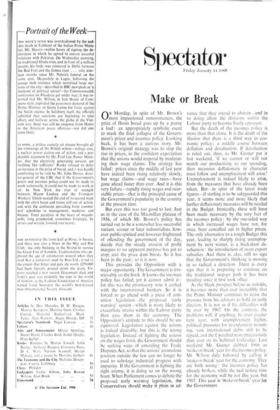Make or Break
ON Monday, in spite of Mr. Brown's most impassioned remonstrances, the price of Hovis bread goes up by a penny a loaf: an appropriately symbolic event to mark the final collapse of the Govern- ment's prices and incomes policy. Looking back, it has been a curious story. Mr. Brown's original strategy was to stop the rise in prices, in the confident expectation that the unions would respond by moderat- ing their wage claims. The strategy has failed: prices since the middle of last year have indeed been rising relatively slowly, but wage claims—and wage rates—have gone ahead faster than ever. And it is this very failure—rapidly rising wages and near- stable prices—that is the principal cause of the Government's popularity in the country at the present time.
But even this was too good to last. Just as in the case of the Macmillan plateau of 1956, of which Mr. Brown's policy has turned out to be a somewhat less successful variant, sooner or later industrialists, how- ever public-spirited and however frightened of offending the government of the day, decide that the steady erosion of profit margins to no apparent purpose has got to stop; and the price dam bursts. So it has been in the past: so it is now.
This provides the Opposition with a major opportunity. The Government is irre- trievably on the hook. It knows the incomes policy has failed; yet it cannot admit it: for this was the promissory note it cashed with the international bankers. So it is forced to go ahead with a piece of anti- union legislation—the proposed 'early warning' system—which is more likely to exacerbate strains within the Labour party than ease them in the economy. The Opposition's attitude to this should be un- equivocal. Legislation against the unions is indeed desirable, but this is the wrong legislation. Instead of lighting the unions on the wages front, the Government should be seeking ways of amending the Trade Disputes Act, so that the unions' anomalous position outside the law can no longer be used to sabotage industrial progress with impunity. If the Government is fighting the right enemy, it is doing so on the wrong front. When Parliament comes to debate the proposed early warning legislation, the Conservatives should make it plain in ad- vance that they intend to abstain—and in so doing allow the divisions within the Labour party to become freely apparent.
But the death of the incomes policy is more than that alone. It is the death of the illusion that there is a third way in eco- nomic policy: a middle course between deflation and devaluation. If devaluation is ruled out, then, as Mr. Gunter put it last weekend, 'if we cannot or will not match our productivity to our spending, then measures deflationary in character must follow and unemployment will arise.' Unemployment is indeed likely to arise, from the measures that have already been taken. But—in spite of the latest trade figures—if sterling is to be safeguarded this year, it seems more and more likely that further deflationary measures will be needed in the Budget. Ironically, these will have been made necessary by the very fact of the incomes policy : by the one-sided way in which increased wages have not, for once, been cancelled out in higher prices. The only alternative to a tough Budget this year, leading to sharply rising unemploy- ment by next winter, is a back-door de- valuation: the introduction of overt export subsidies. And there is, alas, still no sign that the Government's thinking is moving in so radical a direction. There is every sign that it is preparing to continue on the traditional stop-go path it has been treading since it first took office.
As the bleak prospect before us unfolds, it becomes more than ever incredible that the Prime Minister continues to resist the pressure from his advisers to hold an early election. It is not as if his difficulties will be over by 1967. On the contrary, the problems will, if anything. be even greater next year. with unemployment higher, political pressures for re-expansion mount- ing, vast international debts still to be repaid, and the perched more precariously than ever on its habitual knife-edge. Last weekend Mr. Gunter dubbed '1-966 as 'make-or-break' year for the incomes policy. Mr. Wilson duly followed by calling it 'make-or-break' year for the economy. They are both wrong: the incomes policy has already broken, while the real testing time for the economy will be not this year. but 1967. This year is 'make-or-break' year for the Government.


































 Previous page
Previous page